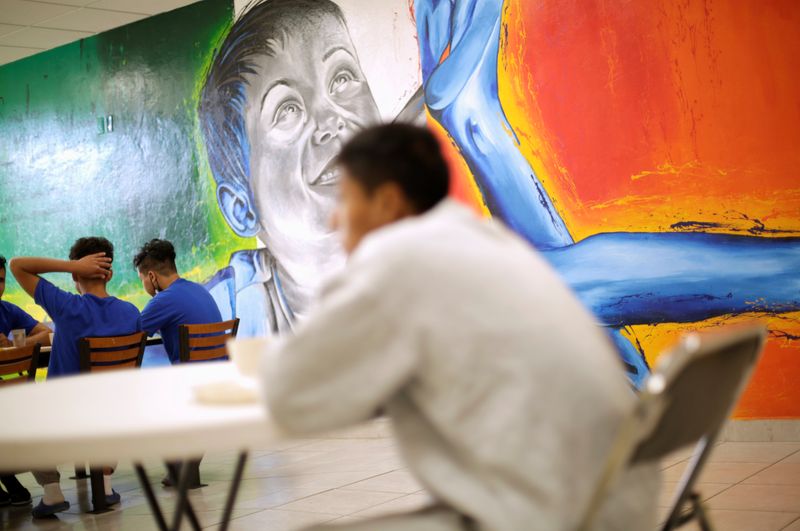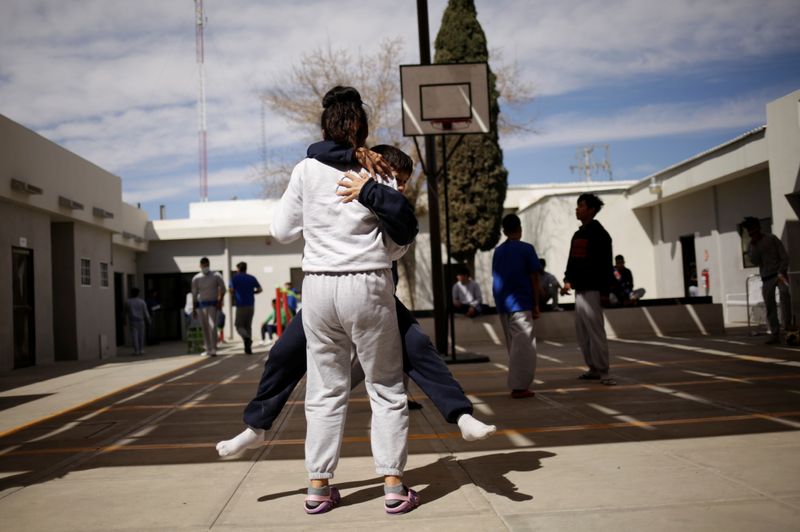By Laura Gottesdiener
LA TECNICA, Guatemala (Reuters) - Honduran mother Alicia Cruz handed herself and her son in to border agents in Texas, then watched as unaccompanied children were separated for release from the group of migrants before adults and families, including hers, were expelled into Mexico.
That's when she contracted a smuggler to ferry Jeffrey, 17, across the border again – alone.
"Leaving my son destroyed me," Cruz said this month, speaking from the Guatemalan-Mexican border as she headed south towards Honduras. She said her son was with relatives in Texas. "The last thing he said was 'let me go to study, work so I can help you'."
Almost 10,000 under-18s from Central America crossed illegally from Mexico into the United States without their parents in February, nearly double the previous month's figures, according to U.S. Customs and Border Protection (CBP) data.
The spike comes after U.S. President Joe Biden's government, citing humanitarian reasons, said in early February it would not rapidly expel unaccompanied minors, a policy shift from the previous administration.
More than any other group of migrants, these children pose a political, logistical and moral challenge for Biden, testing the administration's ability to safely process and house new arrivals fleeing poverty and violence in Central America.
Reuters spoke to over a dozen self-identified smugglers in Mexico, Guatemala, and El Salvador to gain insight into how and why so many unaccompanied minors are moving through the region and crossing the border alone. All requested anonymity or nicknames in order to freely discuss the illegal industry.
The story of how the children reach the United States is varied. Some, like Jeffrey, come as far as the border with their parents; others cross with friends or relatives who are not their legal guardians.
A third group, including children as young as two years old, make the perilous journey through some of Mexico's most lawless, cartel-controlled territory in the care only of human smugglers.
CBP did not immediately respond to requests for comment about the cases detailed by the smugglers and Cruz. Reuters was not able to independently verify the events they described.
More than half the smugglers consulted said they had transported unaccompanied minors in recent weeks, moving them by bus, car, boat and even by plane, which one well-connected smuggler called his network's "faster new method" to bring children up from Central America.
The trips cost thousands of dollars per child and are often financed by parents or relatives already in the United States.
Three smugglers told Reuters they have been encouraging parents to send their children alone as a result of the shift in U.S. policy.
"It's good to take advantage of the moment, because children are able to pass quickly," said Daniel, a Guatemalan smuggler. "That's what we're telling everyone."
A White House spokesperson said last month that Biden's approach was to deal with immigration "comprehensively, fairly and humanely" and not to expel unaccompanied children who arrive at U.S. borders.
A FAMILY BUSINESS
Many children that the U.S. government classifies as "unaccompanied" actually travel with other family members – cousins, uncles, or older siblings.
But some smugglers said their networks have also been organizing children-only trips in recent weeks.
Vazquez, a Mexican smuggler who said he specializes in unaccompanied children, said the youngest child he has transported in recent weeks was a 2-year-old toddler who traveled without any other family members. On his most recent trip, he transported a group of 17 children between the ages of 5 and 9 from southern Mexico across the border into Texas.
Of those 17 children, the majority of their parents were already living in the United States, and none of them were accompanied by other family members, he said.
After moving the children across Mexico by bus, he kept them in his own home near the U.S. border, where his wife and older daughter helped care for them until it was time for him to cross them into Texas and turn them over to U.S. border agents.
"It's a family business," he said.
Vazquez said the cartel that controls the territory along the border in his region mandates that he and other smugglers use the migrant children as a decoy for the cartel's own drug smuggling operations.
Smugglers offer cheaper trips for families and unaccompanied children who plan to surrender themselves to U.S. border agents and ask for asylum, compared to those who seek to enter the United States undetected.
"We deliver children to immigration (agents) and immigration (agents) are responsible for delivering them to their family members in the United States," said Daniel.
Guatemalans make up the largest group of unaccompanied minors, CBP data shows. A second smuggler in Guatemala said that pre-existing relationships between families and smugglers in small towns often make parents more willing to send their kids alone.
"They send their kids with someone they know, who has already transported other family members," he said.
He estimated about 100 children were leaving the city of Huehuetenango, Guatemala, without their parents each week in March, which he said was well above 'normal' levels.
DIRECT BY PLANE
In 2019, smugglers sped up trips to the U.S. border by transporting unaccompanied minors from Central America on express buses.
But Roberto, a smuggler who said he is linked to a powerful cartel in Ciudad Juarez, said his network is now flying minors directly from Central America to the U.S. border by plane.
He was one of three smugglers who told Reuters they are moving children, including unaccompanied minors, on private or commercial flights between Guatemala and Mexico, or between Mexican cities.
Internal Mexican government assessments reviewed by Reuters also state that smugglers have been flying migrants directly to the northern Mexican state of Tamaulipas, or even into Houston, Texas, and Phoenix, Arizona.
Mexican immigration agents detained 95 people, including eight unaccompanied minors, for traveling without proper documentation after they arrived on two domestic commercial flights into the northern city of Monterrey on Friday. The majority were Hondurans, while there were also a handful of people from El Salvador, Cuba and Guatemala, according to Mexican immigration authorities.
CBP, the Mexican foreign ministry, and Mexico's immigration agency did not immediately respond to request for comment about smuggling via commercial flights.
Despite the growing demand, some smugglers told Reuters that they try to steer clear of transporting children.
"It's a risk," said a Salvadoran smuggler who goes by the nickname El Barrenga. "Maybe the child's been stolen, for example. It's safer if they're with their parents."
Even Vazquez, the smuggler who specializes in children, admitted that minors bring their own challenges.

"If an adult causes problems, you can ditch them, easily," he said. "But you can't abandon a child for having a temper tantrum."
